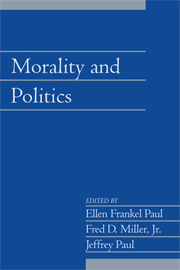Book contents
- Frontmatter
- Contents
- Introduction
- Acknowledgments
- Contributors
- What's Morality Got to Do With It? Making the Right Distinctions
- Unauthorized Humanitarian Intervention
- Thinking Constitutionally: The Problem of Deliberative Democracy
- Representing Ignorance
- Dual Citizenship and American Democracy: Patriotism, National Attachment, and National Identity
- Policy Implications of Zero Discounting: An Exploration in Politics and Morality
- Reflections on Espionage
- Mr. Pinocchio Goes to Washington: Lying in Politics
- A Subject of Distaste; An Object of Judgment
- Against Civic Schooling
- Political Morality as Convention
- Autonomy and Empathy
- God's Image and Egalitarian Politics
- Should political Liberals Be Compassionate Conservatives? Philosophical Foundations of the Faith-Based Initiative
- Index
A Subject of Distaste; An Object of Judgment
Published online by Cambridge University Press: 04 August 2010
- Frontmatter
- Contents
- Introduction
- Acknowledgments
- Contributors
- What's Morality Got to Do With It? Making the Right Distinctions
- Unauthorized Humanitarian Intervention
- Thinking Constitutionally: The Problem of Deliberative Democracy
- Representing Ignorance
- Dual Citizenship and American Democracy: Patriotism, National Attachment, and National Identity
- Policy Implications of Zero Discounting: An Exploration in Politics and Morality
- Reflections on Espionage
- Mr. Pinocchio Goes to Washington: Lying in Politics
- A Subject of Distaste; An Object of Judgment
- Against Civic Schooling
- Political Morality as Convention
- Autonomy and Empathy
- God's Image and Egalitarian Politics
- Should political Liberals Be Compassionate Conservatives? Philosophical Foundations of the Faith-Based Initiative
- Index
Summary
It really is of importance, not only what men do, but also what manner of men they are that do it.
—J. S. Mill, On LibertyTHE PRIVATE AND PERSONAL LIVES OF PUBLIC FIGURES
In recent years it has become increasingly common in the United States and in the United Kingdom for newspapers and other media to expose problematic aspects of the private lives of political (and other public) figures; or, since the facts may already be in the public domain, to draw wider attention to them and to make them the subject of commentary. These “problematic aspects” may include past or continuing physical or psychological illness, eating disorders, drug and alcohol abuse or dependence, financial difficulties, family conflict, infidelity, or certain sexual proclivities of both the political figures themselves and of their family members or intimates. In the United States, the most prominent cases are probably those of President Bill Clinton in relation to a series of alleged extramarital affairs leading up to the scandal involving White House intern Monica Lewinsky, and of President John F. Kennedy, also in relation to marital infidelities. The latter exposure was, of course retrospective, as were revelations of similar matters concerning other presidents and holders of high office. Up until the mid-1960s, while it was sometimes known to the press that politicians had “problems” in their private lives, it was rare for these to be made public.
- Type
- Chapter
- Information
- Morality and Politics , pp. 202 - 220Publisher: Cambridge University PressPrint publication year: 2004

